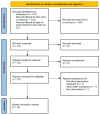The Potential Role of Serotonergic Hallucinogens in Depression Treatment
- PMID: 34440508
- PMCID: PMC8400004
- DOI: 10.3390/life11080765
The Potential Role of Serotonergic Hallucinogens in Depression Treatment
Abstract
Due to an increasing number of depression diagnoses and limited effective treatments, researchers continue to explore novel therapeutic strategies for this disorder. Recently, interest has revolved around the use of serotonergic psychedelics to reduce the symptoms of depression. In this systematic review, we summarize the currently available knowledge on the safety and efficacy of psychedelic substances for the treatment of depression. A literature search of the PubMed/MEDLINE database identified 14 clinical trials from the last 10 years that examined the use of psilocybin, MDMA, DMT, or LSD for the treatment of depression symptoms. Some psychedelics, especially psilocybin, demonstrated an ability to reduce depressive symptoms as measured by several psychological scales, which was often sustained for months after the last psychedelic session. Moreover, one study revealed that psilocybin has comparable efficacy to escitalopram in the treatment of depression. None of the studies reported any serious adverse events associated with psychedelic administration. The reviewed studies suggest that psychedelics have great potential in depression therapy and, after addressing and overcoming the current study limitations, may be used as a novel method of treating depression in the future.
Keywords: DMT; LSD; MDMA; depression; psilocybin; psychedelics; serotonergic hallucinogens.
Conflict of interest statement
The authors declare no conflict of interest.
References
-
- World Health Organization (WHO) Depression. [(accessed on 19 April 2021)];2020 Available online: https://www.who.int/news-room/fact-sheets/detail/depression.
-
- Schmaal L., Pozzi E., Ho T.C., Van Velzen L.S., Veer I.M., Opel N., Van Someren E.J.W., Han L.K.M., Aftanas L., Aleman A., et al. ENIGMA MDD: Seven years of global neuroimaging studies of major depression through worldwide data sharing. Transl. Psychiatry. 2020;10:172. doi: 10.1038/s41398-020-0842-6. - DOI - PMC - PubMed
-
- Dong M., Zeng L.-N., Lu L., Li X.-H., Ungvari G.S., Ng C.H., Chow I.H.I., Zhang L., Zhou Y., Xiang Y.-T. Prevalence of suicide attempt in individuals with major depressive disorder: A meta-analysis of observational surveys. Psychol. Med. 2018;49:1691–1704. doi: 10.1017/S0033291718002301. - DOI - PubMed
Publication types
LinkOut - more resources
Full Text Sources


